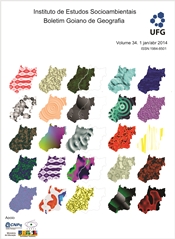ANALYSIS OF ENVIRONMENTAL DEGRADATION IN THE COURSE OF HIGH RIVER BASIN PARAÍBA - DOI 10.5216/bgg.v34i1.29314
DOI:
https://doi.org/10.5216/bgg.v34i1.29314Abstract
The semiarid region of northeastern Brazil has surface water resources scarce and unevenly distributed in space level. This study aimed to assess the environmental degradation in some random points (dams and river bed) in the upper course of the river Paraíba basin. Photographic records were made and collected geographiccoordinates in random spots, identifying the areas and causes of environmental degradation in the region. The results showed that the river waters are getting a high organic load, mainly due to domestic effluents, solid waste and agricultural practices contribute to other factors and degrading pollutants to watersheds and watercourses, as well as the clearing of vegetation native and erosion exacerbate environmental damage. In relation to the physico- chemical parameters of the water, it was observed that the total dissolved solids are suitable for various purposes of uses. There was variation in the chemical oxygen demand, noting that in all the
sampled points, most of the reviews, the water possesses chemical oxygen demand above the limit allowed by CONAMA Resolution 357/2005, as well as the concentrations of matches.
Key words: erosion, solid waste, deforestation, domestic effluents.
Downloads
Downloads
Published
How to Cite
Issue
Section
License
Authors will not receive any payment for publishing their work in Boletim Goiano de Geografia. Therefore, they must grant all rights to the journal. However, they are entirely and exclusively responsible for the published contents, and editors are free to make corrections or adjustments to texts in conformity with publication guidelines.







